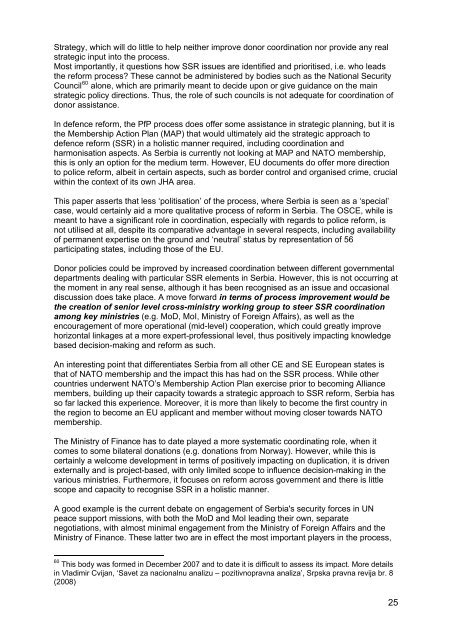Security Sector Reform and Donor Assistance in Serbia - Defence ...
Security Sector Reform and Donor Assistance in Serbia - Defence ...
Security Sector Reform and Donor Assistance in Serbia - Defence ...
Create successful ePaper yourself
Turn your PDF publications into a flip-book with our unique Google optimized e-Paper software.
Strategy, which will do little to help neither improve donor coord<strong>in</strong>ation nor provide any realstrategic <strong>in</strong>put <strong>in</strong>to the process.Most importantly, it questions how SSR issues are identified <strong>and</strong> prioritised, i.e. who leadsthe reform process? These cannot be adm<strong>in</strong>istered by bodies such as the National <strong>Security</strong>Council 60 alone, which are primarily meant to decide upon or give guidance on the ma<strong>in</strong>strategic policy directions. Thus, the role of such councils is not adequate for coord<strong>in</strong>ation ofdonor assistance.In defence reform, the PfP process does offer some assistance <strong>in</strong> strategic plann<strong>in</strong>g, but it isthe Membership Action Plan (MAP) that would ultimately aid the strategic approach todefence reform (SSR) <strong>in</strong> a holistic manner required, <strong>in</strong>clud<strong>in</strong>g coord<strong>in</strong>ation <strong>and</strong>harmonisation aspects. As <strong>Serbia</strong> is currently not look<strong>in</strong>g at MAP <strong>and</strong> NATO membership,this is only an option for the medium term. However, EU documents do offer more directionto police reform, albeit <strong>in</strong> certa<strong>in</strong> aspects, such as border control <strong>and</strong> organised crime, crucialwith<strong>in</strong> the context of its own JHA area.This paper asserts that less ‘politisation’ of the process, where <strong>Serbia</strong> is seen as a ‘special’case, would certa<strong>in</strong>ly aid a more qualitative process of reform <strong>in</strong> <strong>Serbia</strong>. The OSCE, while ismeant to have a significant role <strong>in</strong> coord<strong>in</strong>ation, especially with regards to police reform, isnot utilised at all, despite its comparative advantage <strong>in</strong> several respects, <strong>in</strong>clud<strong>in</strong>g availabilityof permanent expertise on the ground <strong>and</strong> ‘neutral’ status by representation of 56participat<strong>in</strong>g states, <strong>in</strong>clud<strong>in</strong>g those of the EU.<strong>Donor</strong> policies could be improved by <strong>in</strong>creased coord<strong>in</strong>ation between different governmentaldepartments deal<strong>in</strong>g with particular SSR elements <strong>in</strong> <strong>Serbia</strong>. However, this is not occurr<strong>in</strong>g atthe moment <strong>in</strong> any real sense, although it has been recognised as an issue <strong>and</strong> occasionaldiscussion does take place. A move forward <strong>in</strong> terms of process improvement would bethe creation of senior level cross-m<strong>in</strong>istry work<strong>in</strong>g group to steer SSR coord<strong>in</strong>ationamong key m<strong>in</strong>istries (e.g. MoD, MoI, M<strong>in</strong>istry of Foreign Affairs), as well as theencouragement of more operational (mid-level) cooperation, which could greatly improvehorizontal l<strong>in</strong>kages at a more expert-professional level, thus positively impact<strong>in</strong>g knowledgebased decision-mak<strong>in</strong>g <strong>and</strong> reform as such.An <strong>in</strong>terest<strong>in</strong>g po<strong>in</strong>t that differentiates <strong>Serbia</strong> from all other CE <strong>and</strong> SE European states isthat of NATO membership <strong>and</strong> the impact this has had on the SSR process. While othercountries underwent NATO’s Membership Action Plan exercise prior to becom<strong>in</strong>g Alliancemembers, build<strong>in</strong>g up their capacity towards a strategic approach to SSR reform, <strong>Serbia</strong> hasso far lacked this experience. Moreover, it is more than likely to become the first country <strong>in</strong>the region to become an EU applicant <strong>and</strong> member without mov<strong>in</strong>g closer towards NATOmembership.The M<strong>in</strong>istry of F<strong>in</strong>ance has to date played a more systematic coord<strong>in</strong>at<strong>in</strong>g role, when itcomes to some bilateral donations (e.g. donations from Norway). However, while this iscerta<strong>in</strong>ly a welcome development <strong>in</strong> terms of positively impact<strong>in</strong>g on duplication, it is drivenexternally <strong>and</strong> is project-based, with only limited scope to <strong>in</strong>fluence decision-mak<strong>in</strong>g <strong>in</strong> thevarious m<strong>in</strong>istries. Furthermore, it focuses on reform across government <strong>and</strong> there is littlescope <strong>and</strong> capacity to recognise SSR <strong>in</strong> a holistic manner.A good example is the current debate on engagement of <strong>Serbia</strong>'s security forces <strong>in</strong> UNpeace support missions, with both the MoD <strong>and</strong> MoI lead<strong>in</strong>g their own, separatenegotiations, with almost m<strong>in</strong>imal engagement from the M<strong>in</strong>istry of Foreign Affairs <strong>and</strong> theM<strong>in</strong>istry of F<strong>in</strong>ance. These latter two are <strong>in</strong> effect the most important players <strong>in</strong> the process,60 This body was formed <strong>in</strong> December 2007 <strong>and</strong> to date it is difficult to assess its impact. More details<strong>in</strong> Vladimir Cvijan, ‘Savet za nacionalnu analizu – pozitivnopravna analiza’, Srpska pravna revija br. 8(2008)25
















